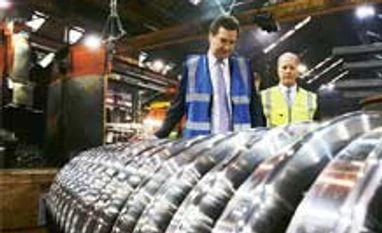Some of India’s top steel producers are trying to keep margins up through innovative waste management. It has not been easy to maintain high revenue streams as the rupee appreciates and demand remains sluggish.
JSW Steel, for instance, has been using technology to cut production costs, saving about Rs 300 crore the previous financial year. “We have been able to improve margins by 0.65 per cent in 2013-14,” joint managing director and group chief financial officer Seshagiri Rao said. “Our top three in-house innovations—the micro-pelletisation unit, mill scale briquetting and enhancing of iron ore slime—help the company save about Rs 160 crore per annum.”
In micro-pelletisation, iron ore particles are separated and put together to make pellets. Extra raw material is thus produced from particles that would otherwise have been a hindrance in functioning of the blast furnace. In the enhanced iron ore slime process, slime thrown out after beneficiation of low-grade ore is treated to generate additional ore.
Steel firms are also looking to lower their power and fuel costs, a significant portion of their total expense. Tata Steel is developing a clean coal technology that aims at reducing the coal ash content and, in turn, improves fuel efficiency.
In 2013-14, Tata Steel’s West Bokaro division in Jharkhand achieved its highest clean coal production of 2.577 million tonnes at 15.5 per cent ash content against a previous best of 2.339 million tonnes at 14.37 per cent, said the 2013-14 report.
Earlier, the company was using coal whose ash content was as high as 35 per cent. Tata Steel aims to reduce the coal ash content to eight per cent. Various interventions were being used to meet this target, the report said.
JSW Steel is using waste gas from blast furnaces to generate 55 Mw of power, saving Rs 200 crore per annum.
In 2013-14, Tata Steel achieved savings of Rs 1,614 crore by improving operational excellence, the company said in its annual report. This included Rs 1,170 crore from an initiative launched in 2010-11 to improve earnings. At Tata Steel Europe, the company's focus on operating costs led to saving of £200 million, which contributed to improved gross earnings at Rs 3,008 crore in 2013-14.
Tata Steel’s greater use of by-product gases, better plant maintenance and higher efficiency brought down the average cost of power per unit to Rs 2.49 per Kwh in the period under review from Rs 2.60 in the previous year.
JSW Steel plans to replace the natural gas feedstock with coke oven gas in the next two and a half years at its Dolvi plant in Maharashtra. This will help the company save Rs 1,000 crore a year. “In 2014-15, we will be replacing 20 per cent of the natural gas with coke oven gas and gradually take it to the optimum point,” Rao said.
“Though this technology has been acquired from overseas, the cost is nothing compared to our savings,” he added. Innovation has not just helped these companies lower costs, it has also opened a new source of income through patents. “We filed for 23 patents and this can become an additional source of income,” Rao said. Of the 23 patents filed, 15 are for Vijaynagar plant, six for Dolvi and balance for Salem plant in Tamil Nadu.
Tata Steel, which has developed a low cost, online and fast method for online sensing of alumina in iron ores is also protecting its innovation via patents. The online detection of alumina is crucial as iron ore fines in India have 3 per cent to5.5 per cent of alumina compared to 1 per cent worldwide, thus affecting blast furnace productivity.
This initiative has resulted in an innovation that enables the blast furnace operation to decide on effective blend planning and impurity reduction. Due to this, the innovation has been protected by two patents, said Tata Steel.
)